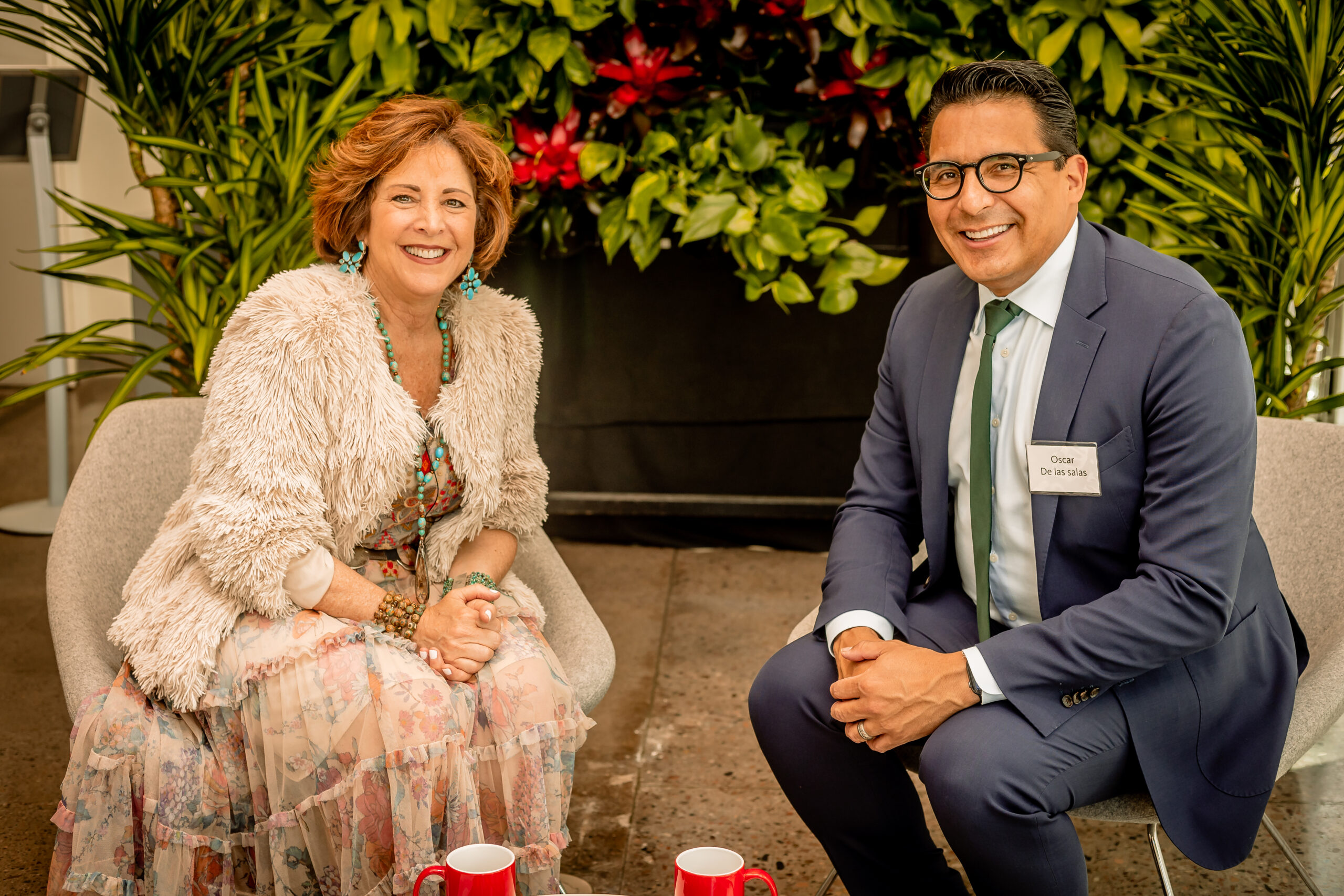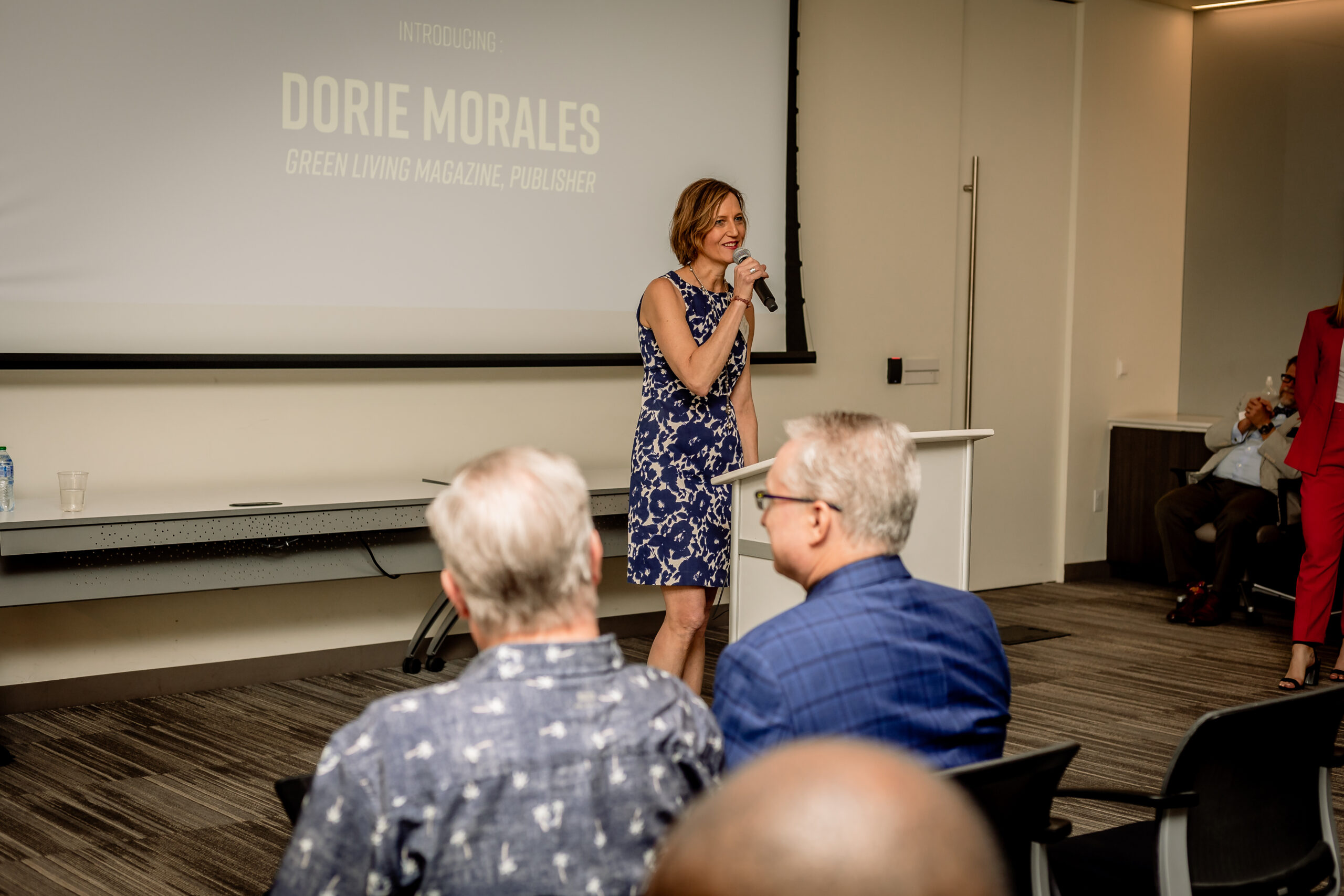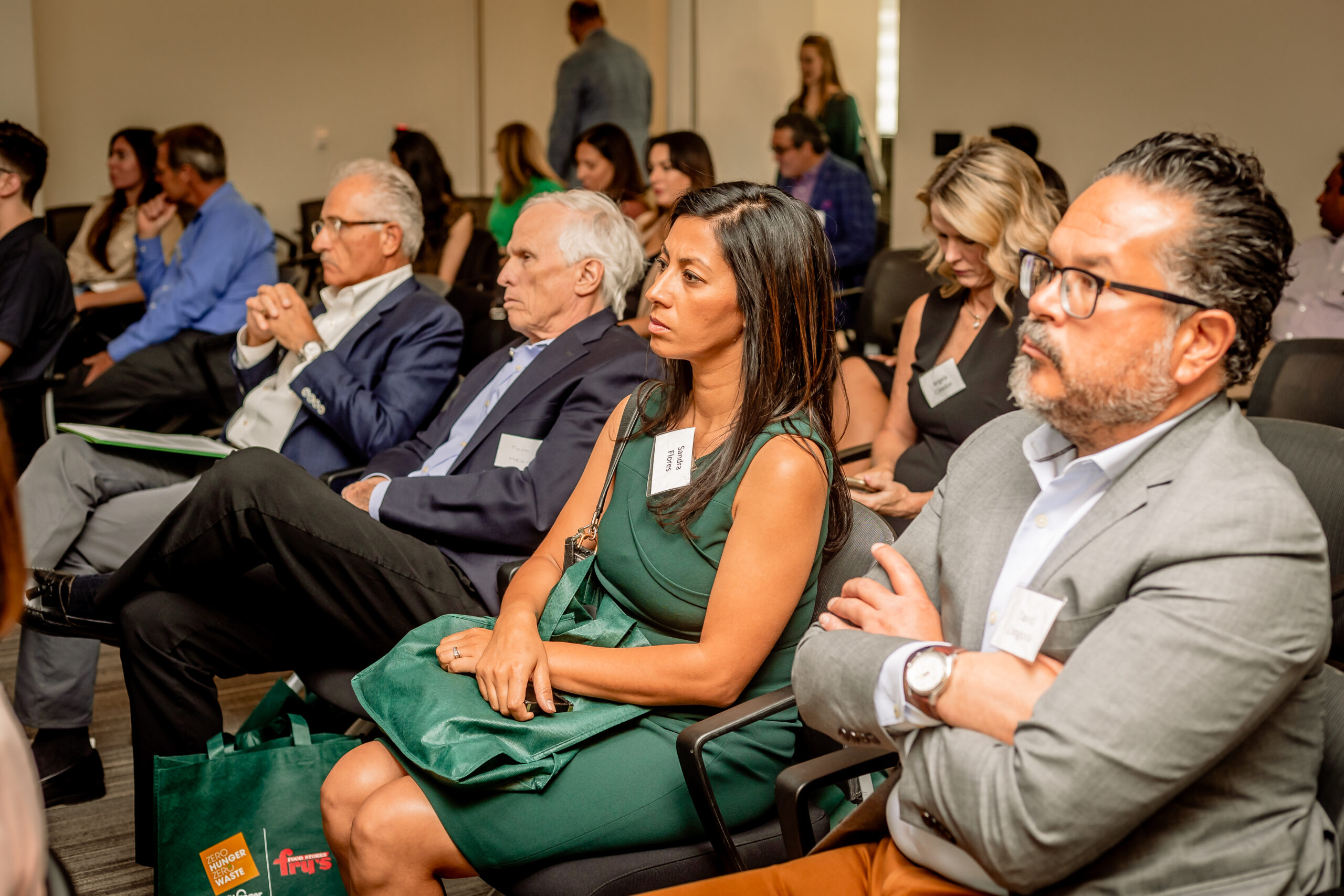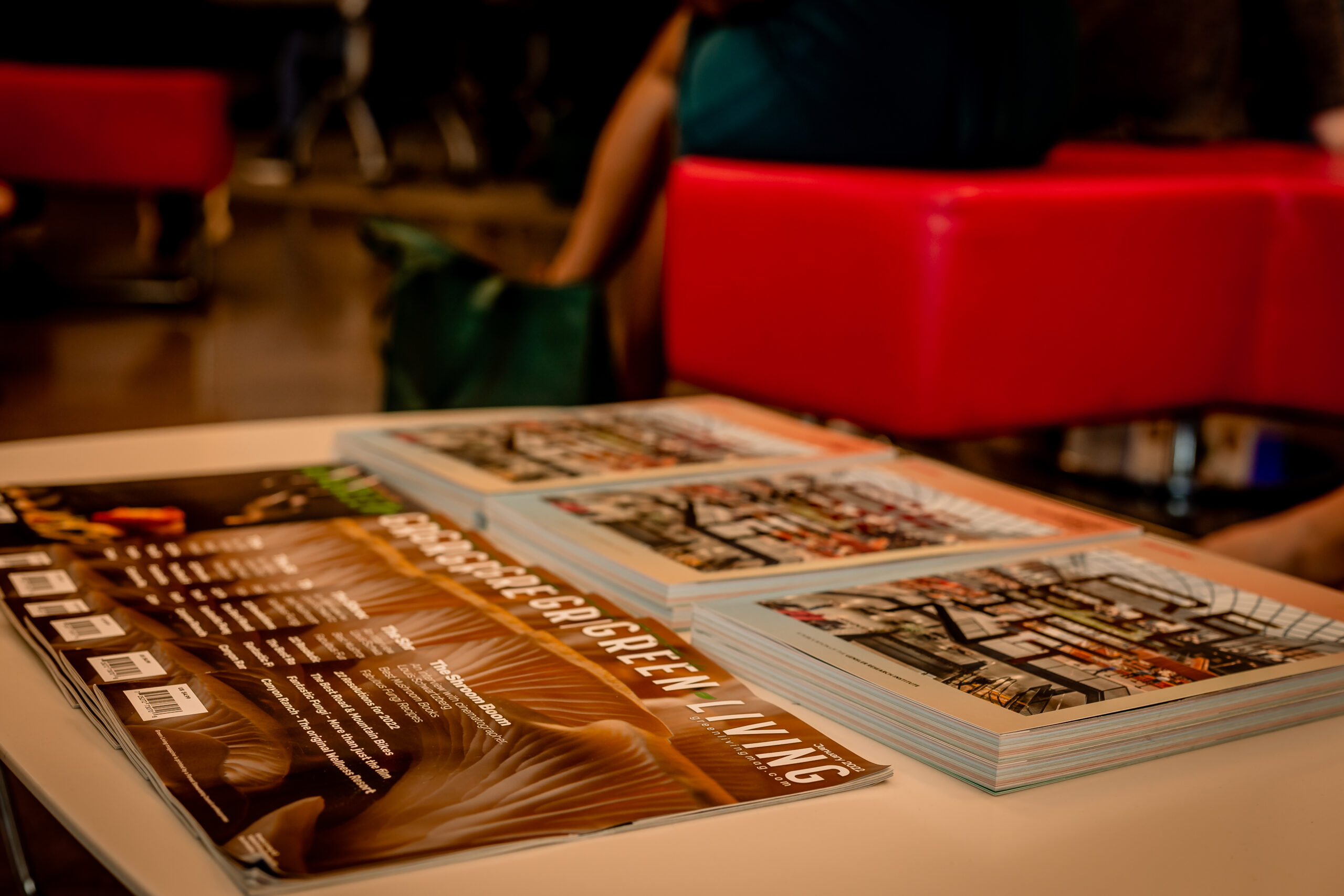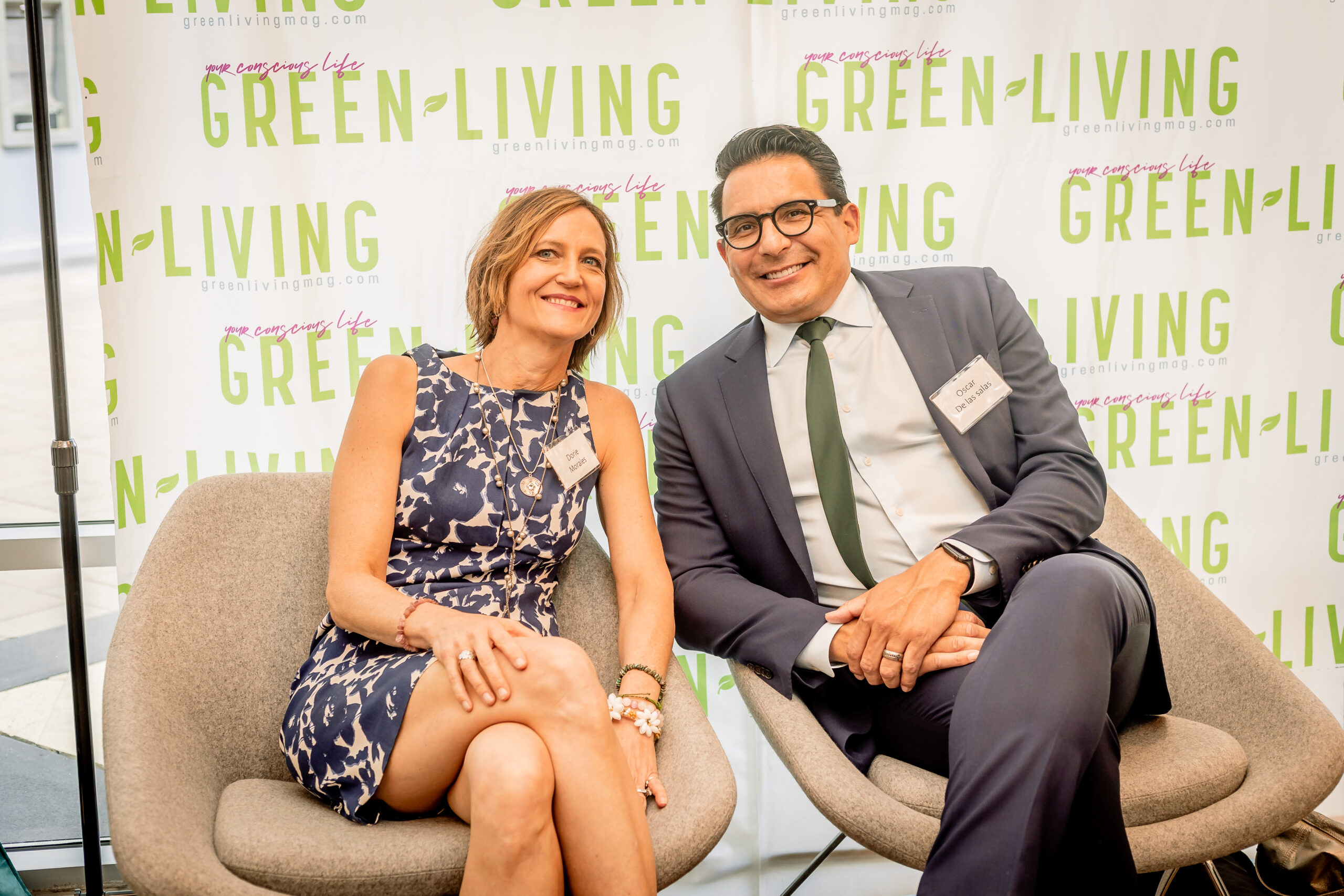On April 22, Green Living Magazine and Gensler hosted the first Earth Day Summit on the Future of Sustainability in Arizona.
Politicians, thought leaders and business owners gathered at E-Center Esplanade in Phoenix to discuss how they are leading their cities towards a sustainable future.
Arizona cities are declaring a climate emergency, prompting city officials to update their Climate Action and Adaptation Plan to achieve community-wide carbon neutrality by the year 2030.
Gensler is a global architecture, design and planning firm with 50 locations across Asia, Europe, Australia, the Middle East and the Americas. Founded in 1965, the firm serves more than 3,500 active clients in virtually every industry. Guided by determined optimism, they believe that the power of design can spark positive change and create a future that promotes equity, resilience and well-being for everyone.
Over the past year, Gensler sharpened their climate action focus with fresh research, new design capabilities and updated priorities to meet their goal of achieving a net-zero carbon portfolio by 2030.
Additionally, it is Green Living’s mission to educate, inspire and motivate as many people as possible to become better stewards of our planet and to encourage others to take the pledge to protect Mother Earth for its future inhabitants.
During the event, Gensler’s Principal and Managing Director Martha de Plazaola Abbott spoke about Gensler’s Cities Climate Challenge. Other Gensler representatives participated including Rives Taylor, Kaley Blackstock and Jay Silverberg.
Keynote speaker, City of Phoenix Mayor Kate Gallego, addressed the audience saying, “This Earth Day, innovation, community engagement and green jobs are at the heart of our climate action for a more resilient Phoenix.”
In addition to Mayor Gallego, others joined in the discussion including Mayor John Giles, City of Mesa, Mayor Kevin Hartke, City of Chandler, Mayor Corey Woods, City of Tempe, Mayor David Ortega, City of Scottsdale, Governor Stephen Roe Lewis of Gila River Indian Community, Congressman Greg Stanton, Congressional Candidate AZ District 1, Ginger Sykes-Torres, Councilwoman Yassamin Ansari, and more.
The audience viewed a recording of Senator Kyrsten Sinema, Senator Mark Kelly and former state Senator of Arizona Bob Worsley.
Businesses such as Cruise, Strategic Microgrid and McDowell Sonoran Conservancy talked about their roles in sustainability arena.
Each member set the stage for their efforts in sustainability, acknowledging that when the group reconvenes at a later date, they would address their successes or failures.
Mayor Corey Woods, City of Tempe, on sustainability:
“It’s something that we absolutely have to do, because as more people continue to come here we have to be able to control our greenhouse gas emissions. We should be talking about ways to electrify our vehicle fleets, internally at the City of Tempe, and other cities. We have a great time now to frankly talk to people about converting to personal electric vehicles, given the cost of gas right now in this country. There are a lot of people who are beginning to talk about now getting electric vehicles and hybrids because it frankly makes more financial sense. So, the big thing I was trying to push on the panel was this is no longer a choice. It never was a choice. But I think people are coming to that realization now that it’s up to all of us to act. And it’s up to all the people in positions like mine, as policymakers, to make sure that we’re pushing these things through and showing real leadership during these times.”
Mayor Kate Gallego, City of Phoenix, talks about programs initiated and underway in Phoenix:
“We’re doing a cool corridors program where we plant about 200 trees at a time in areas that have a lot of students, a lot of people walking and lower income communities. We’ve launched a cool pavement program where we put a lighter colored coating on our pavement, that ASU has found, reduces the surface temperature about 10 degrees. We’re looking at integrating solar in our buildings and more and more often you can park under a solar canopy. In some cases, even electric vehicle charging is part of that. So we hope [to have more] green buildings and green spaces. Phoenix has more acres of park than any other city in the United States, which is a real point of pride for us.”
Governor Stephen Roe Lewis, Gila River Indian Community, on the issue of water:
“I heard some great discussion about water, about some innovative practices. And I think we’re really at a point where we’re looking at very innovative practices that are going to guide us towards our sustainability goals, not just for the city of Phoenix and for the surrounding communities, but for Arizona and for the region because of water and climate change truly affects us, and it truly should unite us on our approaches to the future.”
Mayor John Giles, City of Mesa, talks about the implementation of his city’s Climate Action Plan:
“It’s hard to think of something more important, right? I’m grateful for Earth Day and the opportunity it gives us to focus attention on this issue. I think certainly as a community, the city of Mesa is very engaged on the topic. I’m proud to say that a little over a year ago, we adopted a Climate Action Plan. I’m more proud to say that we’re actually trying to implement that Climate Action Plan. It’s something that has been integrated into all the departments in our organization — and is something we’re anxious to take to the community, as a whole, to engage our residents. And that’s the only way it’s really going to be impactful. I’m grateful for this conference. I’m grateful for this set aside day, so that we must focus our attention on one of the most important topics we could gather to talk about.”
Ginger Sykes-Torres, Congressional Candidate, AZ District 1:
“Sustainability is really thinking about our future generations and what we’re going to leave behind for them. I went to school and studied environmental science and policy at Stanford University, and have been working for the last 20 years in this field of environmental consulting, renewable energy planning, climate resilience planning, and also land use planning. So making sure that when we are thinking about all the land uses that happen across our western United States, we are allocating the right land uses to the right areas and we are not endangering the Endangered Species even more than they are, and not interrupting cultural resources. Arizona as a state has done relatively well planning for the water future. But we are seeing cutbacks in our Colorado River water, storage and supplies. That’s something that our state is really going to have to take seriously in the future and address on a regional scale. There’s no one single entity that can fix the water issue. But I think a lot of it also starts with educating people to conserve water.”
Yassamin Ansari, Councilwoman, City of Phoenix, worked on the UN Secretary General’s Climate Team:
“Science tells us that it is imperative, that leaders at every level, step up and radically decrease greenhouse gas emissions by 2050. It’s the year that we absolutely need to be at carbon net zero in order to avoid the most catastrophic impacts of climate change. So what that means practically, at the local level, is that we need to be making huge strides when it comes to our transportation systems. How we build our cities, our construction habits and also on the resilience and mitigation side of things. We know that Phoenix is already going to be so much hotter. So what can we do to cool our cities down? I have been very focused on transportation because in Phoenix, we know that transportation makes up more than 50% of our greenhouse gas emissions in the city. And it’s also a reason why we have such poor air quality. I’ve been chairing our city’s committee on electric vehicles trying to work on making those more affordable and accessible; working on expanding public transportation, and also making our city more pedestrian-friendly, more friendly to folks who want to bike as their commute method. There’s a lot that we can do. But again, I have learned, at least in the past year, that unless we have elected leaders at this level of government and so many other local offices that I’m worried about the implementation piece and whether things are actually tangibly getting done.”
Steve McClain, CEO of Strategic Microgrid, speaks on the topic of leadership:
“ I said this in a panel that I think that the approach needs to be a little different. And I don’t look at it as much from a climate change standpoint, I look at it from the standpoint of environmental degradation. And I can point to areas in my own life to places that I have lived or been where I can see the environment is degraded significantly — just in the last 10 years or so. And I think one of the things that the scientific evidence fails to convey, and it’s not the scientific community’s issue, it’s really a leadership issue — there is degradation taking place, [and we have to deal with it now] as opposed to putting it out in the future — because it’s really hard to get people, even policymakers to think about doing something that’s going to make a difference 20 years or 30 years down the road.”
Rives Taylor, Principal and Firm-Wide Co-Leader, Design Resiliency, Gensler talks about sustainability over time:
“Sustainability, by its nature, has been around as long as human beings have. To sustain is to keep going, right? And sustainability over the last 25 years has been about how do we do less bad. And we’ve been doing it long enough now, that we have to actually think beyond sustainability. We need to think about regeneration. It’s interesting that there are a lot of phrases all around green or ecological, and fundamentally it means we need to design not only with human beings well-being in mind, but the whole ecosystem’s well-being in mind and think about the long term. The great peoples, the Indigenous leaders of this part of the world, they thought many generations ahead. And that’s really what sustainability needs to be about.”
Kaley Blackstock, Director of Sustainability, Gensler Phoenix, discusses how she works with clients to help them understand sustainability:
“I work with our clients to help them understand what sort of impact their designs and their projects are making, helping translate some of their corporate sustainability goals or ESG tracking into design. How does your project, your real estate footprint, actually coordinate with climate action goals, carbon reduction goals? That’s a little bit of what I do. I also work with our design teams, hand-in-hand, to help select healthier, more sustainable materials; trying to understand how to coordinate with our contractors so that we can actually realize these goals; and then also thinking about the future. How do you frame out a 30-year, 20-year sustainability plan for your corporation or for your campus or for your projects?”
Vanessa Ruiz, Deputy Vice President of Outreach Partnerships, Educational Outreach and Student Services, Arizona State University, and Panel Moderator during the Summit:
“At ASU, certainly, the university has made a tremendous commitment to finding sustainable solutions for all different kinds of issues and topics across the world. As a matter of fact, last week, we inaugurated a new school focused entirely on sustainability and finding the answers to a healthier, better planet down the road. The one thing I do always say though, when the topic of sustainability comes up — at the end of the day, we really can’t do anything if we don’t have a planet — if you don’t have a place to do it. And now I have two young children. I also look at this issue, from their eyes and thinking about their own future and the kind of planet and the kind of environment that they’re going to inherit from us. I look at that as a huge responsibility that we have, and I hope that most of us can step up and meet the needs of that responsibility.”
Jay Silverberg, Principal and Design Director with Gensler, talks about the momentum of sustainability within his firm and with the public:
“We, as a firm, have really championed sustainability and really looked at the broad implications that design and architecture have in our communities. So for us, it’s everything from specifying materials that are sustainable, materials that are particularly here in the desert that are responsive to our heat, and to our direct sunlight that we have; designing projects that have shade and have materials that reflect heat, and the sun does not absorb it. I feel that we put such a strong focus on sustainability. Over the past five years, we have felt a tremendous momentum starting with that. A lot of it is in the communication and really promoting it in a bigger way. I think more people are aware. I think the awareness, at least from our perspective, has been tremendously heightened recently, which has been really, really exciting.”
Martha de Plazaola Abbott, Principal and Managing Director, Gensler Phoenix, talks about Gensler’s company’s goal regarding carbon neutrality:
“By the year 2030, our initiative is to have carbon neutrality for all our projects. There’s a big initiative, firm-wide with that respect. Each office is responsible, individually, for carrying that out … we have a road show that we’re putting together to meet with contractors to talk about how we integrate certain things into our specifications, to explain the process and how things might be different and really educating everyone that we work with. It doesn’t mean that it needs to cost more, it just means you must do it in a very smart and intentional way.”
Mayor Jerry Bien-Willner, City of Paradise Valley, talks about his takeaway from the Summit:
“I was in an earlier presentation where there were some discussions from Gensler about how some simple design tweaks could lower temperatures, in buildings and in homes. I think small things like that impact the broader environment, but also make a difference to people’s lives in Paradise Valley. For example, people want to enjoy the outdoors, outside their home, and to try and understand and learn those types of techniques and [gather] information. It’s just a great resource to have. So that’s a great reason to be here.”
Senator Mark Kelly talks about water conservation in Arizona:
“I have been focused on confronting one of the most serious challenges that our state faces: the ongoing drought over the past year. About a year and a half that I’ve been in the Senate, I fought to secure historic investments in water infrastructure across the state. Our infrastructure law provides nearly $8 billion from Western Water Infrastructure Act to help the Bureau of Reclamation and destined projects across the state which will conserve scarce Colorado River water. Here is what that’s going to look like: Repairing aging dams and pumping stations, lining canals and implementing innovative storage projects and options. And our bill provides historic investments in wildfire prevention, water and wastewater system upgrades and it streamlines the permitting process for new investments in renewable energy. Arizona is already leading the way in developing next generation electric vehicles and autonomous vehicles.”
Senator Kyrsten Sinema speaks about her efforts of sustainability in Arizona:
“A few weeks ago, I hosted Interior Secretary Deb Holland in Arizona to discuss sustainability, green energy and how we can move Arizona into the future. Like with the Rio Reimagined project where innovative solutions are being discussed around water security, renewable energy and sustainability. Focusing on sustainability allows us to look forward, prioritize innovation and create even more economic growth and good paying jobs. investments from our infrastructure law will help create a more sustainable Arizona.”
Mayor David Ortega, City of Scottsdale, talks about his city’s solution to the water shortage:
“Scottsdale is the only city in Arizona that takes wastewater, completely reprocesses it into potable water. Period. We’re the only city that does it. Phoenix, Tempe they don’t. So they discharge water after they treat it or they treat the wastewater. We’re only the third city in the country that does that. What that means is you buy it once. Let it be used and reprocess it; process it again; process it again. That’s where we’re responsible. We’re the only city that does that. In that way, we’re pretty innovative.”
Tracy Cheung, Head of Cruise Academy, Fleet Energy Advisor, says leadership is the key:
“The commitment that needs to happen in sustainability is public and private partnerships, and policy change. All that takes a lot of leadership. It’s kind of fun to have that discussion. And hear more about what’s happening in various industries. In California, we just launched our first completely driverless EV (electric vehicle) with no one driving the car. And our next step is to get that up and running and operate that business and see it scale.”
Justin Owen, CEO of McDowell Sonoran Conservancy, discusses working together collectively:
“We all get to live in this magical beautiful place. Let’s take care of it. Let’s make sure that we don’t harm the ecosystem and make it a sustainable environment. That’s why we’re here today. We’re here because the importance of the connectedness between everybody. It’s all about collaboration. Not a single elected person, a policy change, a business, a nonprofit can make it happen — but collectively we can make it happen. Collectively, we can make our environment, our planet, our ecosystem better. Because when you look at the changes that we’re facing, without getting political, climate change is happening because of interferences in it. And quite often, humans are the largest interference. So how can we make it better and learn from the mistakes we made? And today is all about getting those collaborations together.”
Oscar de la Salas, Organizer of Future of Sustainability and Gensler’s Business Development/Client Relationships Southwest Region, put the Earth Day Summit into perspective:
“We have never encountered a moment in time for all of us, as a community in Arizona, to have this conscious conversation with the right people, in the right environment, at the right time. Earth Day, it’s a celebration of Mother Earth first and foremost. But it’s also a celebration of our accomplishments for what we’ve done about sustainability. But also looking at it in detail and under the microscopic, city by city by city, in order to understand what the cities are doing, but also those companies that are coming to Arizona trying to bring sustainability products or sustainability ideas. So, this conversation will gauge where we are next year, when [we do this again]. We’re going to see if what we’ve said is sustainable and sustained, which is much more important. So we will have an idea of where we are heading next year. It’s a series of conversations that must happen on Earth Day [and everyday].”



